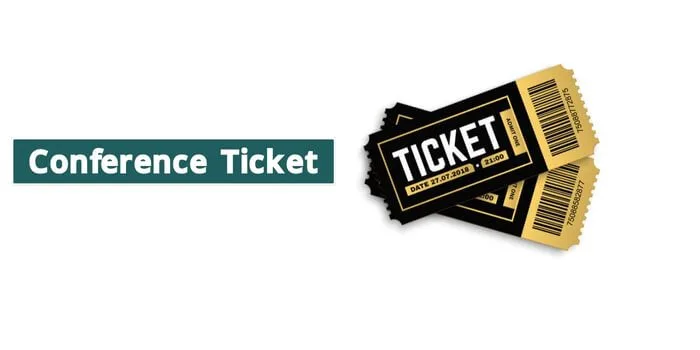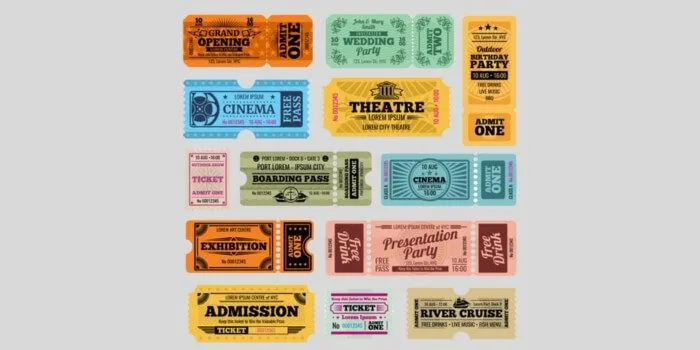Conference tickets are the gateway to events, encapsulating essential details such as dates, venues, and entry permissions. Designing a conference ticket is not just creating a piece of paper for entry, but it’s about crafting an experience that sets the tone for the entire event. Are you looking for the answers to how to design conference ticket?
Designing conference tickets involves embracing key information like event name, date, and venue. Choose a professional layout that reflects the conference theme. Include branding elements for recognition. Ensure clarity and readability to facilitate easy access to pertinent details for attendees.
In this step-by-step guide, we’ll explore the essential elements and considerations to keep in mind when designing your conference tickets. From integrating crucial information like event details and venue to selecting the right layout and design elements, each decision plays a significant role in shaping attendees’ expectations and enhancing their overall experience.
What is a Conference Ticket Exactly?
Conference tickets are the crucial documents granting access to events, containing relevant information such as event dates, locations, and attendee details. They enable smooth entry and organization, aiding both event organizers and participants. A conference ticket is one of the crucial steps to make a conference brochure that features a summary of the whole event.
There are various types of conference tickets, including standard admission passes, VIP tickets offering enhanced privileges, and group packages for organizations sending multiple attendees. The benefits of conference tickets include:
- Streamlining entry processes, reducing congestion and wait times
- Ensuring security by controlling access to authorized attendees
- Facilitating event planning and resource allocation based on ticket sales
- Offering opportunities for personalized experiences and networking with VIP tickets
- Providing organizers with valuable attendee data for post-event analysis and marketing strategies.
Essentially, conference tickets are vital in conference management and attendee satisfaction. So, effective ticketing systems are integral to the success of conferences, improving both organizational efficiency and attendee experience.
How to Design Conference Ticket: A Step-by-Step Guide
Designing a conference ticket requires careful planning and attention to detail. But most of us don’t know how to design conference ticket. Here’s a step-by-step guide to help you create an effective ticket:
Step 1: Gather Information
Collect all necessary details about the conference, including the event name, date, time, venue address, and any special instructions for attendees. A highly informative ticket is a prerequisite to a successful conference.
Step 2: Determine Ticket Types
Decide on the types of tickets to offer, such as general admission, VIP, or group passes based on attendee needs and event requirements. There are some other types of conference tickets such as student tickets, one-day passes, early bird tickets, etc.
Step 3: Choose a Design Template
Select a ticket design template that aligns with the conference theme and branding, ensuring it’s visually appealing and easy to read. An eye-catching design template can feature additional information as well.
Step 4: Customize Ticket Layout
Personalize the ticket layout by adding relevant information, branding elements, and any additional graphics or QR codes for easy access.
Step 5: Review and Proofread
Carefully review the ticket design for accuracy, ensuring all details are correct and there are no errors or inconsistencies. Look for any misinformation or correction needed after the design template and information verification.
Step 6: Print or Distribute Electronically
Print the tickets on high-quality paper stock or distribute them electronically via email or a ticketing platform, ensuring they reach attendees on time.
Step 7: Monitor Ticket Sales
Track ticket sales and monitor attendee registrations to gauge interest and make any necessary adjustments to the ticketing strategy.
You can design conference tickets by following these steps. They provide essential information and enhance the overall attendee experience.
Importance of Designing a Conference Ticket
A ticket serves as a formal entry pass that validates an attendee’s registration, helping control access to the event and ensuring that only registered participants enter. So, it is important to follow all the steps accordingly while designing conference tickets and ensure flawless access to the conference.
- A well-designed ticket provides clear information about event details, such as date, time, venue, and specific session access, reducing confusion for attendees.
- Tickets are often one of the first substantial touchpoints of the conference, reflecting the event’s branding through design elements like logos, colors, and fonts, helping to build brand recognition.
- A well-designed ticket can serve as a memento of the event, which attendees might keep as a reminder of their experience, extending the event’s impact beyond its duration.
- Personalized tickets can make attendees feel more welcomed and valued, enhancing their overall experience.
- A well-designed ticket sets the tone and builds anticipation for the event. It can create a sense of exclusivity and excitement, making the attendees feel eager to participate.
What to Include in a Conference Ticket?
An effective conference ticket contains various key information to ensure a smooth event experience. Here’s what to include in a conference ticket:
- Event Details: Specify the conference name, date, and time clearly for attendees to mark their calendars accurately. Include the location or venue address for easy navigation.
- Attendee Information: Personalize tickets with attendee names whenever possible to enhance engagement and security. Provide contact information for inquiries or assistance during the event.
- Additional Information: Incorporate instructions or guidelines for attendees, such as dress code or special requirements. Include any relevant hashtags or social media handles for attendees to engage online and share their experiences.
- Ticket Type: Clearly state the type of ticket (e.g., general admission, VIP, group pass) to manage access levels and privileges effectively. Include any perks or benefits associated with each ticket type.
- QR Code or Barcode: Integrate a scannable QR code or barcode to facilitate swift entry and enhance security measures. Ensure it’s prominently displayed and easily accessible on the ticket.
- Terms and Conditions: Outline important terms and conditions, such as refund policies, transferability, and liability disclaimers, to inform attendees of their rights and responsibilities.
Your conference ticket will become a comprehensive guide for attendees, enhancing their overall event experience if you include these elements.
Some Fantastic Ideas for Conference Ticket
There are some fantastic ideas you can use to make your conference ticket look more eye-catching and different from the rest conference organizers. Remember, designing your ticket should resemble the purpose of a conference brochure to ensure your participation with no hurdle. Check out some of the best ideas:
Interactive Elements
Incorporate QR codes that lead to exclusive content or interactive experiences related to the conference theme. Add scratch-off sections with hidden messages or prizes to create excitement and engagement.
Unique Materials
Experiment with unconventional materials like wood, metal, or transparent plastic to give your tickets a distinctive look and feel. Consider using eco-friendly materials to align with sustainability goals and impress environmentally-conscious attendees.
Personalization
Customize each ticket with the attendee’s name and personalized message to create a memorable experience. Use variable data printing to automate the process and ensure accuracy while maintaining a personal touch.
Augmented Reality (AR)
Integrate AR technology into your tickets to provide immersive experiences and enhance engagement. Allow attendees to scan their tickets with a mobile app to unlock AR content, such as 3D models, videos, or interactive maps.
Functional Additions
Add practical features to your tickets, such as tear-off portions for drink vouchers or event schedules. Include RFID or NFC chips for contactless entry and access control, providing convenience and security for attendees.
With these creative ideas, your conference tickets will not only serve as entry passes but also as memorable keepsakes that attendees will cherish long after the event.
Frequently Asked Questions
Here are some relevant FAQs about designing conference tickets which you can take a look at:
How Do I Choose the Right Ticket Size and Shape?
Consider factors like portability, visibility, and branding opportunities. Standard sizes like 2″ x 5.5″ or 3.5″ x 8.5″ are common choices, but feel free to get creative with shapes.
What Information Should I Include on The Ticket?
Essential details include event name, date, time, venue address, ticket type, and any special instructions for attendees. Ensure clarity and readability to avoid confusion.
Can I Incorporate Sponsor Logos onto The Ticket?
Yes, featuring sponsor logos can enhance ticket design and provide visibility for sponsors. Ensure logos are appropriately sized and positioned without overshadowing essential information.
Are There Any Design Guidelines for QR Codes?
QR codes should be large enough to scan easily but not overly dominant in the design. Choose contrasting colors to ensure readability and test QR codes to ensure functionality.
How Can I Ensure the Security of My Tickets?
Implement security features like holograms, watermarks, or unique serial numbers to deter counterfeiting. Consider using digital tickets with encrypted barcodes or RFID/NFC technology for enhanced security.
Should I Include Terms and Conditions on The Ticket?
Yes, include important terms and conditions such as refund policies, liability disclaimers, and event rules. Keep the text concise but comprehensive to inform attendees of their rights and responsibilities.
How Can I Make My Tickets Environmentally Friendly?
Opt for eco-friendly materials like recycled paper or biodegradable options. Consider digital ticketing alternatives to reduce paper waste and offer attendees the option to receive electronic tickets.
Final Thoughts
A conference ticket is essential for creating memorable and effective event experiences. By incorporating interactive elements, unique materials, and personalized touches, tickets can become more than just entry passes. That’s why you must learn how to design conference tickets.
However, it’s crucial to avoid overcrowding the design with unnecessary information, neglecting readability, and overlooking security measures. Striking a balance between creativity and functionality is key.
With careful consideration of design elements and attention to detail, conference tickets can elevate the overall attendee experience while ensuring smooth event logistics.








